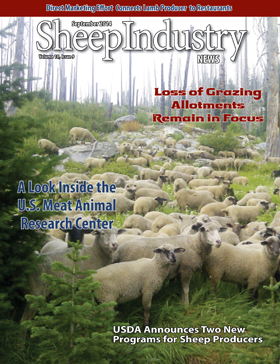
- September 2014
- President’s Notes
- Market Report
- Commentary: Stand Against Activist Organizations
- Direct Marketing: Watson’s Direct Marketing Approach Includes ‘Custom Growing’ Lambs for Fine Restaurants
- Easycare Sheep and Elimination of OPP Focus of U.S. Meat Animal Research Center
- Listening Sessions Invoke Support for U.S. Sheep Experiment Station
- Loss of Grazing Allotments Remain in Focus
- Undersecretary Visits ASI Office to Announce Programs That Will Benefit Sheep Producers
- Washington Rancher Allowed to Defend Flock in Wake of Wolf Attacks
- News Briefs
Listening Sessions Invoke Support for U.S. Sheep Experiment Station
WASHINGTON — The fate of the U.S. Sheep Experiment Station remains in doubt, even after a swelling of support from around the country during a listening session held by the U.S. Department of Agriculture.
As noted in wide-ranging comments during the two days of phone-in sessions, research into sage grouse habitat survival, climate change, fire mitigation, disease resistance in sheep, rangeland grazing strategies and bighorn sheep are valuable work being done at the Station.
The research station has demonstrated an impact on all of agriculture, as well as to all of the nation’s sheep industry; both for the meat industry and in the wool sector, commentors consistently noted.
And it wasn’t just producers near the Dubois, Idaho site that voiced support.
“It’s easy to see how the sheep station benefits sheep producers in the western United States,” commented David Greene, who raises sheep in Maryland. “However, on my operation, I have been using one of the new breeds of sheep developed at USSES since its introduction in 1978. This kind of research has implications across the entire country.”
The impact is felt in all parts of the industy, noted Dan Gutzman, a buyer for Pendleton Wool.
“There has been a surge of interest in the use of domestic wool,” Gutzman pointeed out during the session. “The wool from these sheep and the sheep research from this area is critical for the continuation of commerce in the United States.”
The necessity to maintain the Dubois station from a rural community, economic perspective was defended by multiple groups including the mayor of Dubois, the Clark County commissioner’s office and the Clark County Economic Development Council.
USSES also provides educational opportunities that would otherwise be unavailable.
“As fewer veterinary students come from farming and ranching backgrounds, the lambing externship that [the USSES] provides these students in their clinical training gives them unique experiences under a range setting in supervising the lambing, obstetrics, neonatal care, maintaining health and trying to optimize health in a field setting by working with the staff and veterinarians at the experiment station during lambing,” commented Joan Dean Rowe, DVM, veterinarian and professor in the Veterinary Medicine Department of UC Davis and president of the American Association of Small Ruminant Practitioners.
In response to a comment about closing the station due to wildlife conflicts, Brent Roeder, executive for the Montana Wool Growers Association, stated, “We need to settle wildlife conflicts and other environmental conflicts with sound research and the sheep experiment station has a proven track record of doing this work. The station is in the perfect place and in the perfect time to provide this service.”
Meanwhile, the American Society of Animals Science (ASAS) showed its support for keeping the USSES open by sending a letter from the ASAS Board of Directors to the USDA. In the letter, the group explained how closing USSES will result in immeasurable losses to the sheep industry, animal agriculture and animal science.
“The research, extension and educational prolificacy of the USSES is directly related to the unique nature of the station,” outlined ASAS President Debra Aaron in the open letter to USDA-ARS. “USSES is one of the few units left in the U.S. with a critical mass of scientists, adequate land, diversity of land, animal numbers and a production environment to produce meaningful results related to issues within animal agriculture and particularly in terms of sheep production.”
The letter further outlined the significant scientific contributions USSES has made to sheep production including the development of key sheep breeds, nationwide meat-sire and wool-sire evaluation programs, specific genetic markers and disease pathogen identification, along with eradicating scrapie in the United States.
The USDA, which previously announced that the Sheep Station would close in November, indicated that it would follow its process of reviewing the comments made during the listening sessions. However, it has not indicated any change in plans to close the facility.

